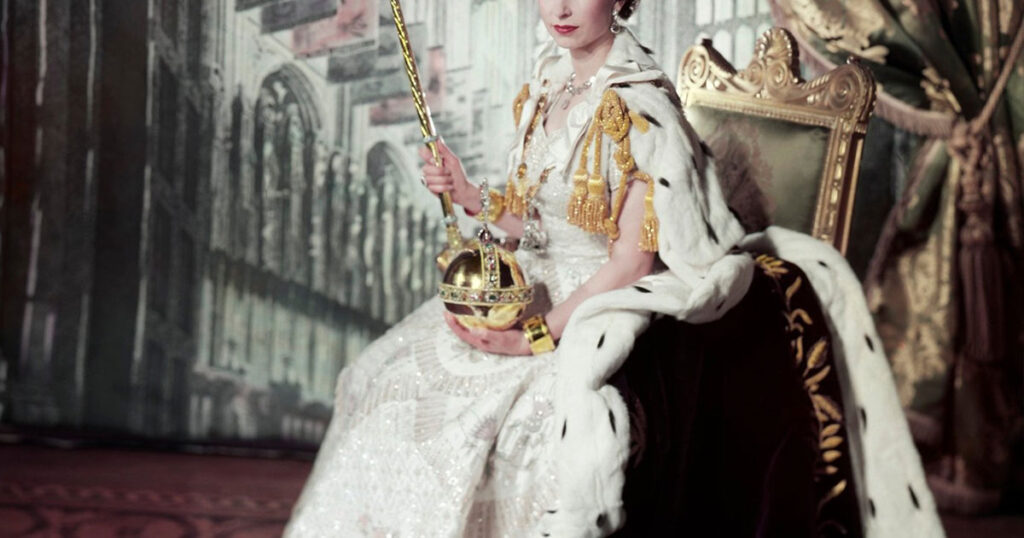
“The struggle once again,” writes Martin Amis in a 2002 New Yorker review of a pair of books about the Queen of England, “was not to divulge emotion but to master it.” He is referring both to the queen’s general demeanor throughout her reign and specifically to her response to Princess Diana’s death. But he is also referring to the bearing of the princes, who at their mother’s funeral were to walk behind the gun carriage that held her coffin. They would be accompanied by their grandfather, Prince Philip. Mastering emotion does not mean hiding all evidence of it, but rather demonstrating that you are stronger than the emotion. In fact, you want it there, noble, beautiful, not like a trick pony that will perform on command but like a wild horse that comes cantering by, full of force, spectacular, but kept at arm’s length. The royal family in Spain has its share of displays of strong emotion. Consider the queen, Leticia, spurning Sofia, the queen mother. The king grasping Leticia’s arm to cut her short. Princess Leonor correcting a slight to her grandmother by pulling Sofia into the picture when she’d been left standing alone at the back of the stage. Not one wild horse, but a herd, ostensibly tamed but perhaps spoiled by the treats being offered.
Amis’s review was republished a year ago, in the August 29, 2022 issue of the magazine, an archival issue devoted to celebrity. Already, Prince Philip, who had offered his steadying presence to his grandsons, had died. The rest of the principals were still living. But the queen’s celebrity was soon to change: 10 days after the article reappeared, on September 8, 2022, the queen died. Martin Amis’s celebrity would also shift after another nine months, in May 2023. By the time I read the issue, nearly a year late, both writer and subject were no more. Reading an article by one dead person about another, recalling the occasion of a third person’s death, I am moved by how fragile existence is. I don’t mean any particular life, but more the fabric of a time: it is torn, then shredded. It doesn’t exist except in tatters. The year 2022 is gone, so is 2002, and so is 1996, when Princess Di’s car smashed into the cement walls of the Paris tunnel. As they say in the songs, the tears—those tears—have all been shed. I wonder at the notion of mastering any emotion. First because I find I am myself a ragbag of different ones, much more than a collection of attitudes or beliefs. Joy, sadness, excitement, thrill, fear, blinking on and off nearly randomly. Rather than dominating my emotions to show only the appropriate ones, according to my education, I am rocked by emotions that pop up, almost willy-nilly, like the heads of the rodents in the arcade game Whac-a-Mole. I cannot dominate them because there is no predicting them, and I have no chance to prepare.
In addition, the notion of mastering one’s emotions as a labor for life feels doomed. What emotion appears and lasts long enough to master? Can’t one just blink it away? Wrath, fear, exhilaration: their flare hardly lasts long enough to pay heed to. They gallop in with a shake of their shining manes and then dash away again. But you know they will return. Let us just assassinate emotions, all of them, for the tricksters they are, and live in peace.
Staring at the keyboard, wondering what I really feel about this particular situation of reading something about dead people by dead people, which seems to put them on equal footing, I note the author’s difference in attitude toward the departed and toward the living—the superiority of the living, how they matter. The subsequent deaths, however, make a mockery of that distinction. It’s as if death is already laughing at the rest of us. So I sit in a muddle. I find the letters of the keyboard beckoning. A code. QWERTY. What to make of the letters? Queen, Windsor, Elizabeth? All pertinent. Rather than the subject, though, it is my response that is in doubt. Queasy, wistful, and empathetic. But no—let’s kill off the emotions by ignoring them. Not regret but Reign, not tenderness but Tennyson. Tennyson? Yes: the poet laureate par excellence, the queen’s favorite—though not this queen’s but Victoria’s, another with a long tenure whose consort, like Philip, was a favorite and who also died before she did. Tennyson, who wrote of nature, “So careful of the type she seems, / So careless of the single life.” And the Y? Yikes!

